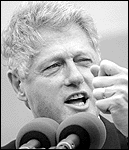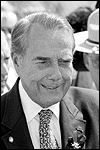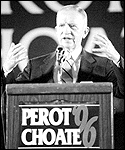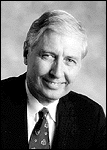
President
Bill Clinton
Democrat
Date of Birth - August 19, 1946
Place of Birth - Hope, Arkansas
Family - Wife: Hillary Rodham; one daughter
Education - B.S. Georgetown University 1968, J.D. Yale University 1973
Professional Experience - Member of the law school faculty at the University of Arkansas at Fayetteville.
Political Experience -
- Attorney General of Arkansas 1976-1978
- Governor of Arkansas 1978-1992
- President of the United States- 1992-Present
Miscellaneous - Studied at Oxford University in the United Kingdom as a Rhodes Scholar from 1968 to 1970.
On Education - The President has a number of policies he would like to implement if elected to a second term. Possibly the most notable for college students is a proposed tax deduction of no more than $10,000 per year for college tuition costs. Cli nton also wants to expand the College Work Study program which, according to the president's figures, would increase the number of students involved in work study to 1 million from the current 700,000 within the next five years. The President is calling f or the Hope Scholarship which would give all college students a $1,500 refundable tax credit for their first year of college. Students would be eligible for a second year as long as they earn a B average in their first year. Finally, the President plans to offer a $1,000 scholarship for college to the top 5 percent of all high school graduates.
On Welfare Reform - The meat of Clinton's welfare reform proposals includes the Welfare-to-Work Jobs Challenge. The cost of this program by the President's figures is estimated at $3.4 billion, which would be covered by a reduction in corporate sub sidies. Included in the proposal is a tax credit which would allow employers to claim a 50 percent credit on the first $10,000 of annual wages for long-term welfare recipients. He also plans to give a tax credit on investments made in distressed areas.
On the Economy - Clinton, like his main opponent, Bob Dole, plans to give parents a $500 dollar per child tax credit. Another Clinton proposal includes the consolidation of over 70 overlapping federal job training programs into a single, $2,600 vo ucher allowing those who fall under these programs the opportunity to choose the training programs that are right for them. The President is also planning a total of $110 billion in tax cuts. Under the Clinton administration, the economy has grown a total 2.4 percent in the past three years.
On Crime - The President has four main proposals in relation to crime. First, he will call for a ban on the manufacturing of so-called "cop killer" bullets which have been known to penetrate bullet proof vests. Secondly, the President plans to urg e states to keep violent criminals incarcerated for at least 85 percent of their sentences. The President is also calling for a "One-Strike-And-You're-Out" program for those who commit crimes while living in public housing. Finally, Clinton plans to exten d the Brady Bill to prevent those who commit random acts of violence from buying guns.
On the Environment - If elected to a second term, the President would expand upon community right-to-know policies to lower pollution. Clinton is also looking to expand upon the Superfund toxic waste clean up which would double the pace of cleanup so that approximately two-thirds of priority states will be cleaned by 2000. Increases in the penalties for criminal polluters and the regulations on drinking water are other Clinton proposals.

Bob Dole
Republican
Date of Birth - July 22, 1923
Place of Birth - Russell, Kansas
Family - Wife: Mary Elizabeth Hanford; one daughter
Education - B.A. Washburn University; LLB, Washburn University 1952
Professional Experience - U.S. Army 1943-48; Attorney
Political Experience -
- Russell County (KS) Attorney, 1953-1961
- U.S. House 1961-1969
- U.S. Senate 1969-1996
- Senate Majority Leader 1984-1986, 1995-1996
- Senate Minority Leader 1986-1994
- Presidential Candidate 1980, 1988, 19 96
Miscellaneous - Attended the UA from 1942-1943.
On Education - The former Senator from Kansas is a supporter of school vouchers. He is proposing Opportunity Scholarships for Children. These scholarships, which would be funded by $2.5 billion in federal funds designed to allow parents to send their children to any school that elects to participate in the program. Elementary through middle school students would receive $1,000 annually while high school student would receive $1,500 each year. These scholarships would go to lower and middle income American families with school children in up to 15 states including Washington D.C. The states involved with Dole's voucher program will match the federal funds with state funds. The Dole camp says the cost of the program will be offset by "reducing the Department of Education overhead, bureaucracy, and wasteful spending." Dole also plans to increase funding for student loans and the maximum Pell Grant award for the "most needy students."
On Welfare Reform - Dole plans to give more power to the states in regards to welfare reform. He plans to end the federal welfare entitlement to the states in order for the states to have more flexibility to implement the reforms they see fit. Dole plans for a five year limit on welfare payments and requires able-bodied welfare recipients to find work within two years. Finally, Dole will propose an elimination of all federal benefits except in case of emergency to illegal aliens.
On the Economy - Possibly Dole's best known promise exists in economics; a proposed 15 percent across the board tax cut. One of the economic goals of the tax cut is to achieve an economic growth rate of 3.5 percent which would, according to Dole nu mbers, would double the per capita income within the next generation. Dole is in favor of a Balanced Budget Amendment and the $500 dollar per year tax credit.
On Crime - Dole has a number of policies he plans to implement if elected. The number one goal Dole has in combating crime is working to reduce the drug problem by cutting teen drug use within the next four years. Dole also plans to work with the states to expand prison capacity and make criminals work in order to "offset the costs of incarceration and pay compensation to the victims of their crimes." Finally, Dole is in favor of an instant check system which would search the background of all peo ple wishing to buy guns.
On the Environment - Bob Dole supports the development of electric vehicles and the production of vehicles which run on natural gas, methane, and other clean burning fuels. He plans to give more environmental control to states and localities to m eet the environmental problems as they see fit. Dole also desires to reform the Endangered Species Act limiting the number of species on the list. Finally, he supports reforms to the Superfund Program, a federally funded hazardous waste cleanup program.

Ross Perot
Reform
Date of Birth - June 27,1930
Place of Birth - Texarkana, Texas
Family - Wife: Margot Birmingham; one son; four daughters
Education - United States Naval Academy 1953
Professional experience -
- Salesman for IBM 1957-1962
- Founder of Electronic Data Systems 1962
- Board of Directors of General Motors 1984-1986
- Founder of Perot Systems 1988
Political Experience - Candidate for President 1992
Miscellaneous - Perot received the Medal for Distinguished Public Service from the Department of Defense in 1972.
On Education - Perot, who is making his second run for the Presidency, is in favor of restoring local control to public schools, extending parental involvement in the schools and de-emphasizing the construction of "fancy buildings."
On Welfare Reform - Perot believes "a good-paying job is the ultimate welfare reform." He is opposed to denying welfare benefits to unwed mothers and believes jobs that have been going overseas should stay in the United States. As a result, Perot would call for the repeal of NAFTA and GATT.
On the Economy - Perot sees taxes as a major problem with the economy. If elected, he plans to repeal the IRS and the tax code, replacing them with another system. Perot would study the proposed tax systems such as the flat tax and national sales t ax and come up with the most viable solution. He believes the voters should decide whether or not federal taxes should be increased. Perot is also in favor of reforming federal entitlements and is in favor of a Balanced Budget Amendment.
On Crime - In the area of crime, Perot would enforce a nationwide version of "Three-Strikes-and-You're Out" which would require all criminals convicted of three violent crimes to serve life sentences. He also plans to make more federal facilities a vailable to "establish rehabilitation centers for youths convicted on drug or violent crime charges." Some of the centers could include closed military bases. Perot is pulling for more cost efficient prisons that require inmates to work. Finally, he plans to impose public and private joint programs aimed at reducing gang activity.
On the Environment - There are a number of environmental plans Perot plans to instill in the government if elected. He plans to "develop a long term energy policy that will decrease dependence on oil and increase research into alternative energy s ources such as natural gas, geothermal, hydroelectric, and solar technologies." Perot also plans to increase research in the development of consumer materials which would be less damaging to the environment. Finally, he would improve recycling technology and programs nationwide.

Harry Browne
Libertarian
Place of Birth - New York City 1933
Family - Wife: Pamela Lanier Wolfe; one daughter
Education - No college degree
Professional Experience -
- Author of 10 books
- Financial advisor
- Public speaker
- Newsletter writer
Political Experience - None
Miscellaneous - His book, You Can Profit From a Monetary Crisis , was number one on the New York Times Bestseller list in 1974.
On Education - The Libertarian candidate desires to completely remove the federal government's influence on public education. Browne's main campaign focus is to repeal the federal income tax which, according to Browne, would allow parents to send their children to any private or parochial school and allow them to home school their children.
On Welfare Reform - Browne plans to eliminate all federal welfare programs and entitlements if elected. Browne believes federal entitlements discourage welfare recipients from becoming self-supporting.
On the Economy - The author of ten books believes government spending needs to be sharply cut. He is calling for a 50 percent reduction of the federal budget within one year. Browne desires to eliminate the IRS and the tax code without any form of replacement. He hopes to do away with income, social security, estate, gift and capital gains taxes. Finally, by selling off all federal assets, Browne believes the government could "pay off the federal debt completely."
On Crime - Browne believes the War on Drugs has failed and will continue to fail. He plans to legalize all currently illegal narcotics if elected. Browne would free all non-violent drug users and dealers from the federal prisons to make way for more violent criminals.
On the Environment - No information on the candidate's environmental stance could be found.

